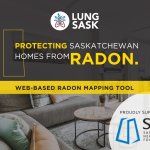Claim Your Radon Testing On Income Tax
Great news! If you have tested your home for radon, you may be able to claim the cost of the radon test on your income tax. In order to qualify, you must also qualify for "work-space-in-the-home expenses" or are self-employed.
The Canadian Revenue Agency has confirmed that an employee (salaried and commission) may deduct a portion of the cost for radon testing (for example, a radon test kit or the services of a radon measurement professional) as a work-space-in-the-home expense, as such costs are incurred for the maintenance of the home and this same inclusion is extended to a self-employed individual.
However, where it is determined that radon reduction is needed at the employee’s home, the cost of such equipment (including installation), cannot be deducted because the amount is on account of capital.
The letter from CRA outlines what defines a "work from home" employee, and that radon testing is deemed an acceptable expense to claim if you work from home or are self-employed.
CRA Ruling Letter
Dear Ms. Warkentin and Mr. Dean:
Re: Deductibility of amounts paid for radon testing and the installation of a mitigation system
We are writing in response to your correspondence dated October 15, 2020 and December 22, 2020, about whether the amounts paid for radon testing and the cost of a radon mitigation treatment system are deductible under the Income Tax Act (Act).
Specifically you are requesting whether these costs can be claimed by an individual as either work-space-in-the-home expenses or eligible medical expenses.
Our comments:
This technical interpretation provides general comments about the provisions of the Act and related legislation (where referenced). It does not confirm the income tax treatment of a particular situation involving a specific taxpayer but is intended to assist you in making that determination. The income tax treatment of particular transactions proposed by a specific taxpayer will only be confirmed by this Directorate in the context of an advance income tax ruling request submitted in the manner set out in Information Circular IC 70-6R11, Advance Income Tax Rulings and Technical Interpretations.
Work-space-in-the-home expenses Employee
Generally, where an employee incurs expenses in the course of performing the duties of an office or employment, a deduction is available for certain expenses, provided that the particular expense is specifically identified in section 8 of the Act, and all the conditions in that section have otherwise been met.
Expenses incurred by an employee in connection with a work space in the home can only be deducted if the employee (salaried or commission) meets the conditions described in the Act. Subsection 8(13) of the Act requires that the work space must either be:
- the place where the individual principally (more than 50% of the time) performs the office or employment duties for a period of at least four consecutive weeks; or
- used exclusively during the period to which the expenses relate to earn income from the office or employment and, on a regular and continuous basis, to meet clients or other persons in the ordinary course of performing the office or employment duties.
With respect to the deductibility of expenses incurred for a work space in the home, the employee must also generally be required under his or her contract of employment to pay for such employment-related expenses.
Subsection 8(10) of the Act requires that the employee obtain a signed and completed Form T2200, Declaration of Conditions of Employment (or if applicable, Form T2200S, Declaration of Conditions of Employment for Working at Home Due to COVID-19), from his or her employer, in order to claim the above mentioned deduction.
As discussed in Guide T4044, Employment expenses and the Canada Revenue Agency (CRA) webpage titled “Home office expenses for employees”, deductible work-space-in- the-home expenses for both a salaried and commission employee include a reasonable proportion of the expenses paid by the employee for the maintenance of the home (for example, the cost of fuel, electricity, water, light bulbs, cleaning materials, maintenance and minor repairs). However, salaried and commission employees cannot deduct capital expenses (for example, replacing windows, flooring, furnace).
It is our view that an employee (salaried and commission) may deduct a portion of the cost for radon testing (for example, a radon test kit or the services of a radon measurement professional) as a work-space-in-the-home expense, as such costs are incurred for the maintenance of the home. Where it is determined that a radon mitigation treatment system is needed at the employee’s home, the cost of such equipment (including installation), cannot be deducted because the amount is on account of capital.
For more information on work-space-in-the-home expenses and all the requirements that must be met, see Chapters 2 and 3 of Guide T4044.
Self-employed
Business expenses relating to the use of a work space in the home may be claimed on line 9945, “Business-use-of-home expenses” on Form T2125, Statement of Business or Professional Activities. Paragraph 2.1 of Income Tax Folio S4-F2-C2, Business Use of
Home Expenses (the “Business Folio”), applicable to individuals who are a sole proprietor or a partner in a partnership, discusses the conditions and restrictions placed on the deductibility of business expenses that relate to the use of an office or other work space in an individual’s home, and states:
“An individual can deduct expenses incurred in earning income from a business or property, subject to satisfying various requirements under the Act. In order to be deductible as a current expense, an outlay or expense must meet at least the following general requirements:
- it must be made for the purpose of gaining or producing income from the business or property (paragraph 18(1)(a));
- it must not be on account of capital (paragraph 18(1)(b);
- it must not be made for the purpose of gaining or producing exempt income (paragraph 18(1)(c));
- it must not be a personal or living expense (paragraph 18(1)(h); and
- it must be reasonable in the circumstances (section 67).”
In addition to meeting each of the general requirements as stated in paragraph 2.1 of the Business Folio, the requirements outlined in subsection 18(12) of the Act must also be met in order to deduct business use of home expenses. As described in paragraph 2.4 of the Business Folio, the work space must either be the principal place of business or used only to earn business income and used on a regular and continuous basis for meeting clients, customers, or patients.
Paragraph 2.28 of the Business Folio discusses the deductibility of maintenance costs or minor repairs to an individual’s home (for example, regular maintenance or minor repairs to the home furnace or air-conditioner). Paragraph 2.30 of the Business Folio explicitly denies expenses for outlays on account of capital, expenses not related to an individual’s work space, and personal or living expenses.
It is our view that a self-employed individual may deduct a portion of the cost for radon testing (for example, a radon test kit or the services of a radon measurement professional) as such costs are incurred for the maintenance of the home. Where it is determined that the cost of a radon mitigation treatment system is needed, the cost of such equipment (including installation) cannot be deducted because the amount is on account of capital.
Medical expenses
The CRA’s general views regarding the medical expense tax credit (METC) are contained in Income Tax Folio S1-F1-C1, Medical Expense Tax Credit (the “Medical Folio”).
Generally, an individual may claim the METC in respect of eligible medical expenses incurred in respect of the individual, the individual’s spouse or common-law partner, or a dependant of the individual, as described in paragraphs 1.2 to 1.7 of the Medical Folio.
As outlined in paragraphs 1.8 to 1.11 of the Medical Folio, there are a number of conditions that must be satisfied in order for an individual to claim a METC for the medical expenses they have paid in a particular year.
Medical expenses eligible for the METC are limited to those described in the Act. If a particular expenditure is not described as an eligible medical expense in the Act, or if the conditions under which the expenditure would qualify are not met, the expenditure does not qualify for purposes of the METC, even though the expenditure may have been incurred for medical reasons.
For information regarding the types of medical expenses described in subsection 118.2(2) of the Act, see paragraphs 1.24 to 1.146.3 of the Medical Folio. The cost for radon testing (for example, a radon test kit or the services of a radon measurement professional), or a radon mitigation treatment system (including installation), are not described in these paragraphs since these items are not provided for in the Act. Therefore, such costs would not be an eligible medical expense for purposes of the METC.
We trust that these comments will be of assistance to you.
Yours truly,
Lita Krantz, CPA, CA
Manager, Tax Credits and Ministerial Issues Business and Employment Division
Income Tax Rulings Directorate
Legislative Policy and Regulatory Affairs Branch





